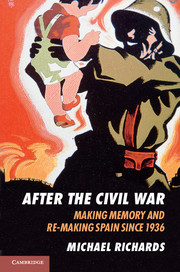Book contents
- Frontmatter
- Contents
- List of maps and tables
- Preface
- Acknowledgements
- Maps
- Introduction: cultural trauma in Spain
- Part I Setting the scene
- Part II Memories of war during the Franco years
- 3 Repression and remembrance: the victors’ liturgy of memory
- 4 Repression and reproduction: social memory in the 1940s
- 5 Memory and politics: from civil war to Cold War
- 6 Memory and migration: flight from the countryside in the 1950s
- 7 Commemorating ‘Franco's peace’: the 25th anniversary of the Victory
- 8 Contesting ‘Franco's peace’: transformation from below in the 1960s
- 9 Transition and reconciliation: politics and the Church in the 1970s
- Part III Memories of war after Franco
- Conclusion: the history of war memories in Spain
- Glossary and abbreviations
- Sources and select bibliography
- Index
- References
8 - Contesting ‘Franco's peace’: transformation from below in the 1960s
Published online by Cambridge University Press: 05 June 2013
- Frontmatter
- Contents
- List of maps and tables
- Preface
- Acknowledgements
- Maps
- Introduction: cultural trauma in Spain
- Part I Setting the scene
- Part II Memories of war during the Franco years
- 3 Repression and remembrance: the victors’ liturgy of memory
- 4 Repression and reproduction: social memory in the 1940s
- 5 Memory and politics: from civil war to Cold War
- 6 Memory and migration: flight from the countryside in the 1950s
- 7 Commemorating ‘Franco's peace’: the 25th anniversary of the Victory
- 8 Contesting ‘Franco's peace’: transformation from below in the 1960s
- 9 Transition and reconciliation: politics and the Church in the 1970s
- Part III Memories of war after Franco
- Conclusion: the history of war memories in Spain
- Glossary and abbreviations
- Sources and select bibliography
- Index
- References
Summary
Fear had been assumed and dealt with, not through withdrawal, but through a form of complicity, resulting in a kind of fleeing forwards in order to achieve things deserving of praise; later this fear demanded an often impossible payment in return, in a manner which thrust deeply into a person for the rest of his or her life.
‘Normalisation’ and society
As Chapter 7 suggested, when significant dates in the life of a people previously in conflict with itself come to be celebrated, questions related to coexistence are reopened, often with great intensity. The Franco regime's solution was to ‘normalise’ history and memory by replacing the crusade narrative with the mask of ‘fratricidal conflict’, supposedly confirmed by ‘objective’ consideration of the past. Neither the new narrative of the war nor state-sponsored history writing permitted the story of the defeated to emerge. Having explored in Chapter 7 the public politics of the past and of memory in 1964, in this chapter I focus on society and social change. Even more than the 1940s and 1950s, the social ‘story’ of the 1960s is of migration. In 1964 alone, according to the Instituto Español de Emigración, some half a million individuals in Spain left their province of residence to live in another. As we have seen, migration presented a possible alternative to the ‘silence’ of reimposed normality in daily life after 1939, especially in rural communities torn apart by wartime conflict. Beginning with ‘Year Zero’ the victors defined what was meant by ‘normality’. The Francoist mayor of a small town in Huelva ignored the bitter local violence of the civil war when he explained in 1963 how ‘once the military passed through, order was restored and little by little things have returned to normal since then’.
- Type
- Chapter
- Information
- After the Civil WarMaking Memory and Re-Making Spain since 1936, pp. 217 - 245Publisher: Cambridge University PressPrint publication year: 2013

